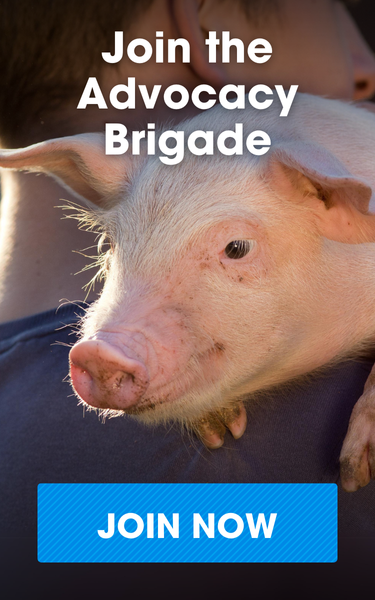
Bad Bills Are Dominating State Legislatures: Here’s What You Can Do Today!

Keeping track of policy proposals that impact farm animals can be challenging with dozens of bills introduced at the state and federal levels each session. The ASPCA serves as your eyes and ears in state capitols across the country to help you keep up with emerging legislation—both good and bad. Here are some bills you need to know about and ways you can take action to protect farm animals.
Big Ag’s Bad Dirty Dozen
Ag-Gag Laws: Four Bills Introduced
Ag-Gag laws are designed to silence whistleblowers from revealing animal abuses on industrial factory farms, also known as Concentrated Animal Feeding Operations (CAFOs). While many courts have overturned state ag-gag laws because they unconstitutionally limit free speech, some legislators and industrial agriculture interest groups continue to push these bills.
This year alone, Iowa, Kansas, Kentucky and Oklahoma have all introduced versions of ag-gag legislation aimed at preventing access to factory farms, banning drone photography of factory farms and intimidating whistleblowers by publicizing their names and making them more susceptible to retaliation.
Right To Farm Laws: Five Bills Introduced
Deceptively named “Right-to-Farm” laws seek to greatly limit the ability of states to regulate conditions on farms, including the cruel confinement of animals and other environmental and public health threats. They also make it harder for communities living near factory farms to take action to protect their own health and well-being. Five of these bills have already popped up in Arizona, Missouri, Nebraska, Oklahoma and Wisconsin.
Greenwashing Factory Farming’s Climate Impact: Two Bills Introduced
Factory farms are contributing to climate change and polluting our environment, but the industrial agriculture lobby has cooked up a greenwashing scheme, making false or misleading claims so their pollution appears more environmentally friendly. The most dangerous of these is factory farm gas, where CAFOs are turning the methane emissions from massive manure lagoons into a revenue stream under the guise of climate change mitigation. Proposals to qualify factory farm gas as a renewable fuel in Michigan and North Carolina would further entrench factory farms and enrich big corporations while doing little to mitigate the pollution.
Forcing Hens Back into Cages: Two Bills Introduced
In a blatant attempt to roll-back farm animal protections, lawmakers in Rhode Island and Utah have introduced bills that would delay the implementation of the states’ bans on extreme confinement of farm animals. For example, if the Rhode Island bill is passed, the state would push the timeline out to 2034 while allowing the continued use of cruel battery cages—a housing system where egg-laying hens are in filthy, crowded cages stacked on top of each other, never seeing the light of day or being able to move freely.
Hope on the Horizon
While Big Ag has been busy pushing their destructive agenda, several bills have been introduced across the country to build a more ethical, humane farming system.
Banning Cruel Confinement of Egg-Laying Hens
In February, Maryland legislators reintroduced a bill that aims to ban the confinement of egg-laying hens in commercial operations. If passed, Maryland would join 15 other states, including California and Massachusetts, that have banned some of the most extreme forms of confinement, like battery cages, veal crates and gestation crates.
Supporting More Humane Food in Institutions
The Good Food New York Bill would allow New York institutions, like schools, hospitals and correctional facilities, to spend up to 10% more on food sourced from vendors that meet specific values-based criteria, including animal welfare. If passed, this important bill would encourage public institutions to use the power of food procurement to improve the lives of millions of farm animals, while also supporting environmental sustainability, racial equity, fair labor practices, local economies and nutrition.
Funding Higher-Welfare Farming
We are working in California to establish the Resilient Farms and Ranches Grant Program, which would provide funding to help farmers adopt higher-welfare farming practices, like raising animals on pasture and improving facilities to help farm animals withstand the impacts of climate change. Californians could be voting to support funding for the new grant program this November in a climate bond on the 2024 ballot!
What You Can Do
You can help advance bills that protect farm animals and fight ones that don’t. Please join the ASPCA Advocacy Brigade to receive urgent alerts and breaking news that impact animals in your community and beyond.
You can also visit the ASPCA Advocacy Center right now to view a list of current state and federal alerts that need your voice today.

